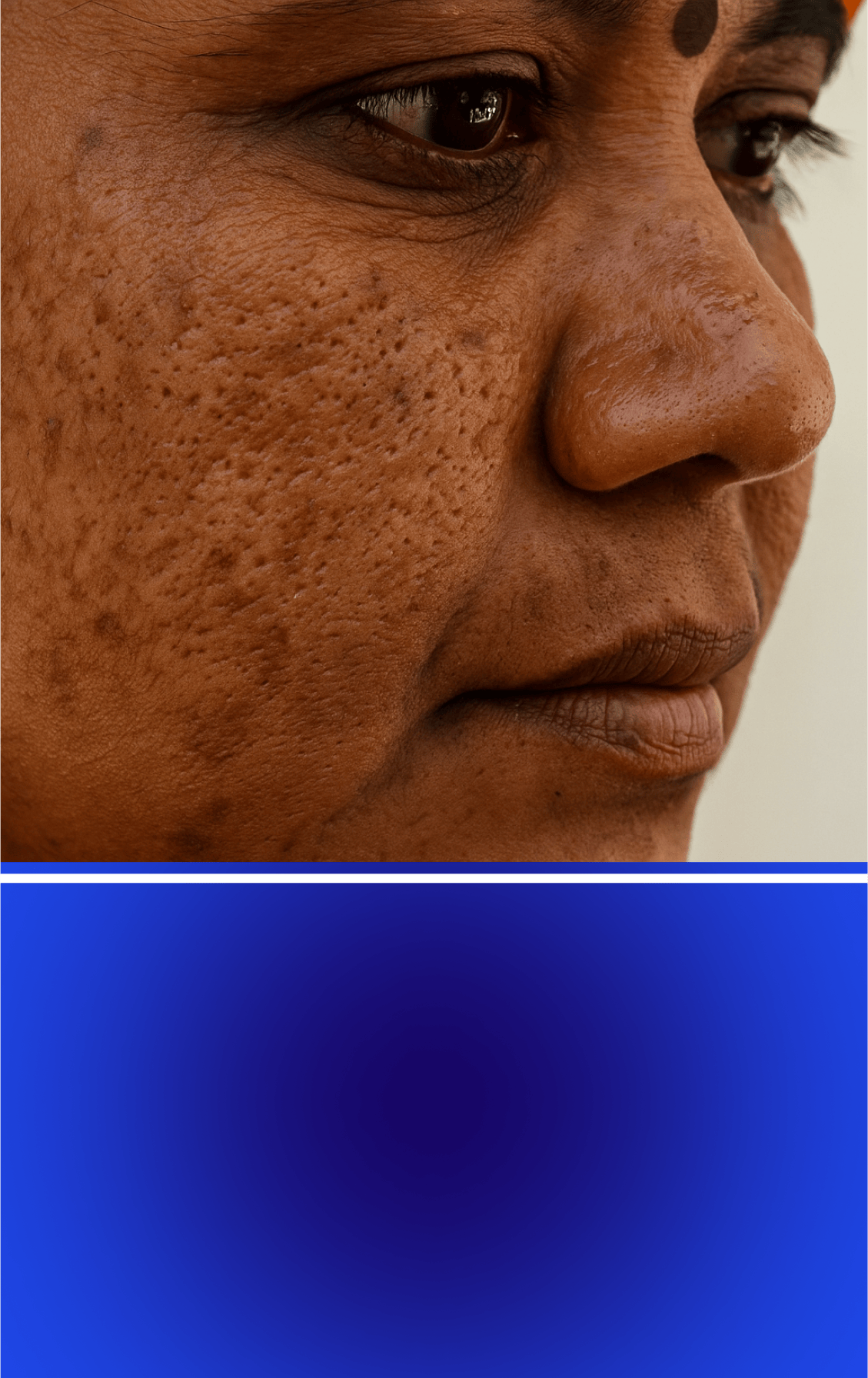Living with red, scaly patches on your skin can feel overwhelming and isolating. You're not alone in this journey. Recent studies show that over 125 million people worldwide live with psoriasis, making it one of the most common chronic skin conditions.
The constant itching, burning sensation, and visible symptoms can affect your confidence and daily activities. Many people with psoriasis report feeling self-conscious about their appearance. However, there's hope ahead.
Modern psoriasis treatment options have advanced significantly, offering effective relief and management strategies. With proper medical care and the right treatment plan, you can regain control over your skin health.
In this guide, we will look at the causes, symptoms, treatment options, and practical steps you can take to keep psoriasis under control with the help of your dermatologist.
Overview
- Psoriasis is a long-term inflammatory condition that may involve the skin, nails, and joints, caused by an overactive immune response.
- Triggers such as stress, infections, certain medications, and climate changes can worsen flare-ups.
- Early diagnosis allows for better control through topical treatments, phototherapy, oral medicines, or lifestyle changes.
- Regular dermatology consultations help adapt treatment plans as your symptoms and skin needs change.
What is Psoriasis?
Psoriasis is a long-term skin condition that affects millions of people worldwide. It is not contagious. Psoriasis happens when your immune system becomes overactive and makes skin cells grow too quickly. This causes thick, scaly patches on your skin that can be itchy or uncomfortable.
The word “psoriasis” comes from the Greek words psora and iasis, which mean “itch” and “condition.” So it can be thought of as an “itching condition,” which describes one of the main ways it affects you.
Psoriasis often comes and goes, with flare-ups followed by periods when your skin looks better. It can also affect your mood and confidence, causing stress, anxiety, or low self-esteem. Around 17.58% of people with psoriasis may also develop joint pain, called psoriatic arthritis.
Psoriasis usually appears in these areas:
- Elbows and knees
- Scalp
- Hands and feet
- Neck and face
- Nails
Less often, it may appear in your mouth or around private areas.
Effective psoriasis treatment is available and can help you deal with your symptoms. Early professional diagnosis leads to better long-term management outcomes. Working with a dermatologist ensures you receive evidence-based treatment tailored to your specific needs.
Common Types of Psoriasis
Knowing the type of psoriasis you have can help you understand how it may affect your skin, your daily comfort, and your overall health. Each type comes with its own pattern, severity, and potential triggers, which can influence how you manage flare-ups and respond to treatment.
Below are the main types of psoriasis, along with what to look for and tips to manage them effectively.
Plaque Psoriasis
In Plaque Psoriasis, you may notice raised, red patches covered with silvery-white scales, often on your elbows, knees, scalp, and lower back. Plaques can flare with stress, cold weather, or infections. Moisturising regularly and following your prescribed treatment helps reduce discomfort and scaling.
Guttate Psoriasis
Guttate psoriasis appears as small, drop-shaped spots on your skin. These often show up suddenly across your torso, arms, and legs, usually after a strep throat infection, especially in children and young adults. Guttate psoriasis may resolve on its own, but prompt treatment can prevent flare-ups and reduce discomfort.
Inverse Psoriasis
Inverse psoriasis affects skin folds such as your armpits, groin, and under your breasts. The patches are smooth, red, and shiny rather than scaly, and the skin can feel sore or irritated. Gentle cleansing and avoiding friction in these areas can help manage symptoms.
Pustular Psoriasis
Pustular psoriasis is a rare form characterised by white, pus-filled bumps surrounded by red skin. It can be localised to your hands and feet or more widespread. Immediate medical care is essential if you notice rapid spread or severe discomfort.
Erythrodermic Psoriasis
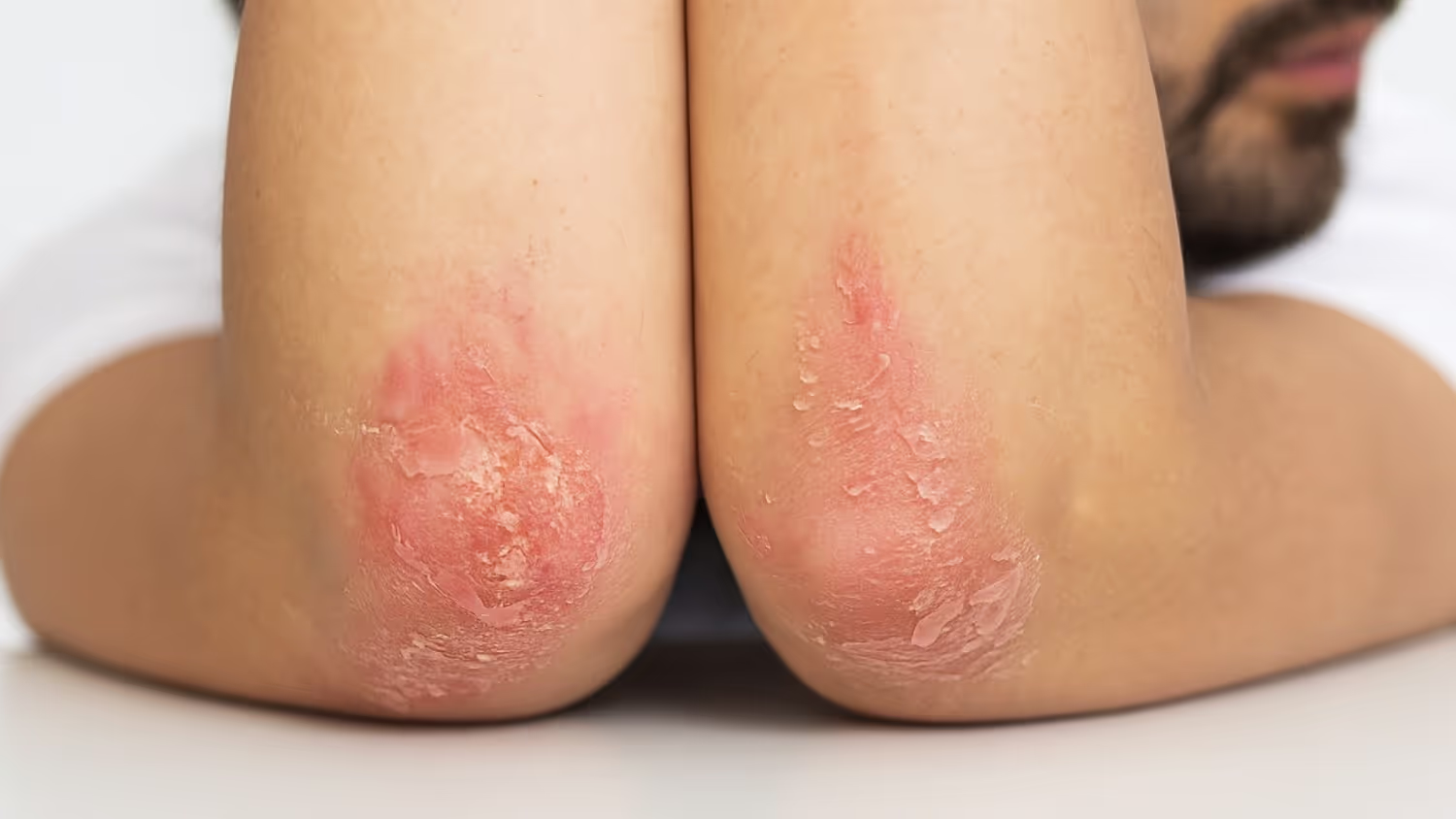
Erythrodermic psoriasis is a serious, rare type that covers most of your body with red, peeling skin. It can be life-threatening, with symptoms like severe itching, pain, and rapid heart rate. Early medical attention is essential.
Nail Psoriasis
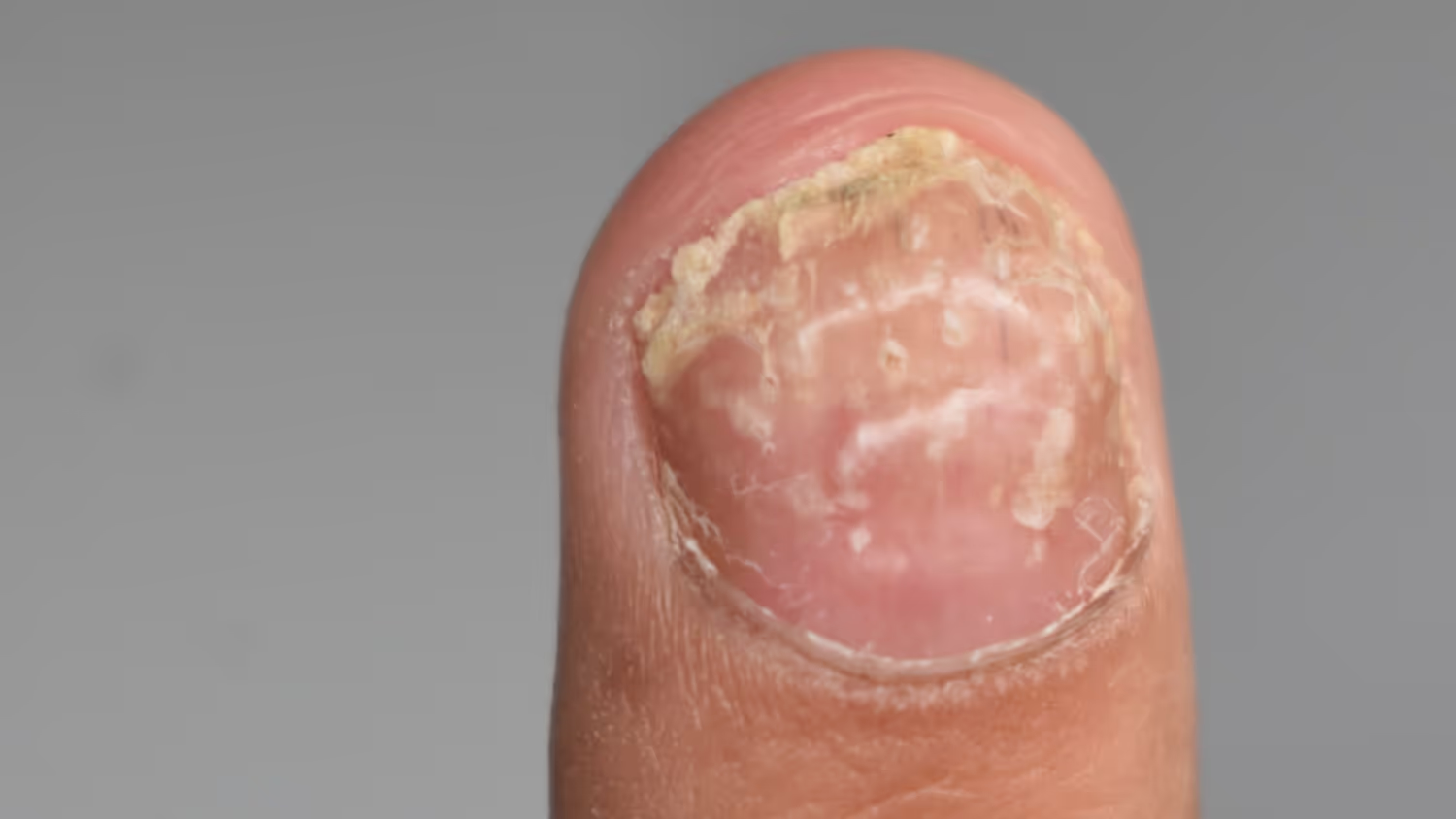
Nail psoriasis affects your fingernails and toenails, causing pitting, ridges, discolouration, or separation from the nail bed. About half of the people with psoriasis experience nail changes, often alongside other types. Keeping nails trimmed and clean can prevent infections and make daily tasks easier.
Scalp Psoriasis

Scalp psoriasis affects the skin of your scalp, sometimes extending beyond your hairline. Red, thick, scaly patches can resemble severe dandruff, and hair may temporarily fall out. Using gentle, medicated shampoos can reduce flaking and irritation.
Common Symptoms of Psoriasis
Recognising psoriasis early helps you act quickly and prevent worsening. Watch for these signs:
- Persistent, Itchy Patches: Raised, red areas that itch, burn, or sting, often recurring in the same spot. If the irritation lasts for weeks or months despite moisturisers, it could indicate psoriasis.
- Flaky, Silver-White Scaling: Skin may peel in silvery scales. Unlike regular dry skin or eczema, psoriasis patches are usually thicker and sharply defined.
- Dry Cracks and Bleeding: Deep cracks in the skin that sometimes bleed or hurt, especially on hands, feet, elbows, or knees. Frequent cracking with no apparent injury may point to psoriasis.
- Nail Changes: Pitting, ridges, discolouration, or nails lifting from the nail bed. If you notice these alongside skin changes, it may indicate nail psoriasis.
- Recurring Flare Patterns: Symptoms often come and go in cycles. Noticing repeated episodes in the same areas can help distinguish psoriasis from other skin conditions.
- Joint Discomfort or Swelling: Morning stiffness, swelling, or pain in fingers, toes, or larger joints may signal psoriatic arthritis, which sometimes develops alongside skin symptoms.
Tip: If you recognise several of these signs, especially persistent patches, scaling, or nail changes, don’t ignore them. Early diagnosis means better results and fewer complications. Consider booking a consultation with Velantis Dermatology, where Dr. Janani Sree C M can create a personalised care plan to help you manage symptoms and protect your skin’s health.
What Are Some Common Causes and Triggers of Psoriasis?
Psoriasis happens when your immune system becomes overactive, causing inflammation and rapid skin cell growth. While the exact reason you develop psoriasis can vary, several underlying causes and triggers influence when and how your symptoms appear. Knowing these can help you manage flare-ups and protect your skin.
Causes of Psoriasis
Several factors contribute to the development of psoriasis:
- Genetic Factors: Psoriasis often runs in families. If one parent has psoriasis, your risk is about 14%; if both parents are affected, it rises to 40%. Researchers have identified over 25 genes linked to the condition, though having these genes doesn’t guarantee you’ll develop it.
- Immune System Dysfunction: Normally, your immune system fights infections. In psoriasis, it mistakenly attacks healthy skin cells, causing inflammation and rapid skin cell turnover.
- Hormonal Changes: Shifts during puberty, pregnancy, or menopause can trigger new symptoms or worsen existing ones.
- Other Health Conditions: Obesity, metabolic syndrome, or certain autoimmune conditions can increase the risk and severity of psoriasis.
These causes explain why some people are more prone to psoriasis than others. Genetics set the stage, but the immune system and other factors determine how and when symptoms appear.
Triggers of Psoriasis
Even after psoriasis develops, certain factors can worsen flare-ups or bring on new patches:
- Stress: Emotional stress can intensify symptoms and create a feedback loop where psoriasis increases stress, worsening the condition.
- Skin Injuries: Cuts, scrapes, sunburn, friction from clothing, or other minor skin trauma can provoke new patches.
- Infections: Strep throat and other infections often trigger guttate psoriasis, especially in children and young adults.
- Medications: Some drugs, including beta-blockers, lithium, antimalarials, and certain anti-inflammatories, may worsen symptoms.
- Weather: Cold, dry conditions often aggravate psoriasis, while warmth and humidity may improve skin health.
- Lifestyle Factors: Smoking, heavy alcohol use, and poor sleep can increase flare-up frequency and severity.
- Diet and Weight: Obesity and diets high in processed foods can increase inflammation and worsen symptoms in some people.
Diagnosis of Psoriasis
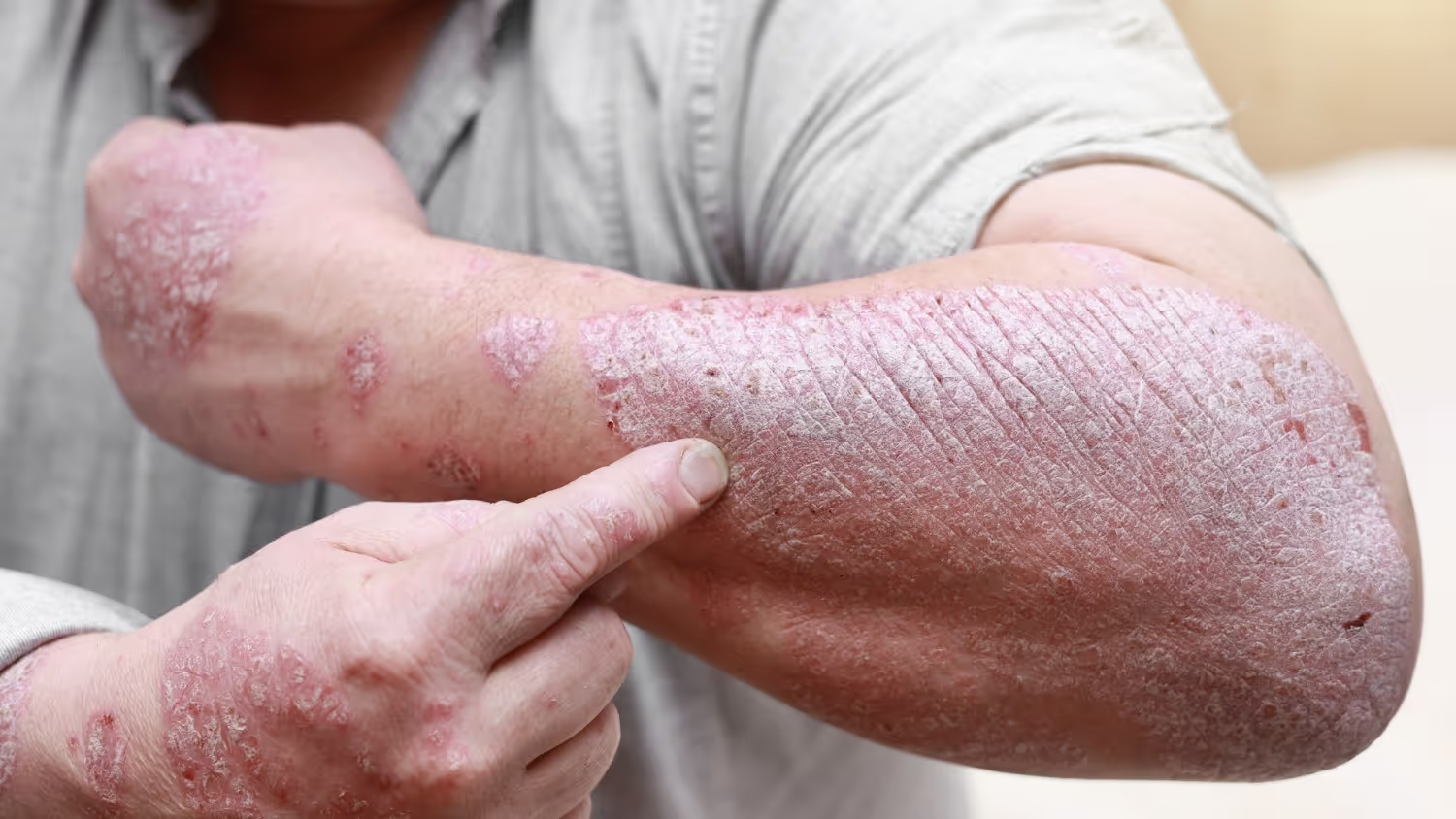
Dermatologists use several approaches to confirm psoriasis by examining your skin, nails, and medical history. These methods help identify psoriasis accurately and distinguish it from other skin conditions.
Physical Examination
During your visit, the dermatologist carefully inspects your skin, scalp, and nails. They look for red, inflamed patches with thick, silvery scales, noting their size, shape, colour, and distribution. This visual assessment provides an initial picture of your psoriasis.
Medical History
Your doctor will discuss your symptoms in detail, asking about triggers, flare patterns, and family history of psoriasis or autoimmune conditions. Sharing this information helps the dermatologist tailor the diagnosis and plan the most effective treatment for you.
Skin Biopsy
In some cases, a small skin sample may be taken to be examined under a microscope. This test confirms psoriasis by showing cellular changes and rules out other skin conditions.
Koebner Phenomenon
The dermatologist may check for the Koebner phenomenon, where new psoriasis patches appear at sites of skin injury or trauma. Observing this pattern can support the diagnosis.
Nail Examination
If your nails are affected, the doctor examines them for pitting, thickening, discolouration, or separation from the nail bed. Nail involvement is common in psoriasis and provides additional evidence to guide your treatment.
Psoriasis Treatment Options|
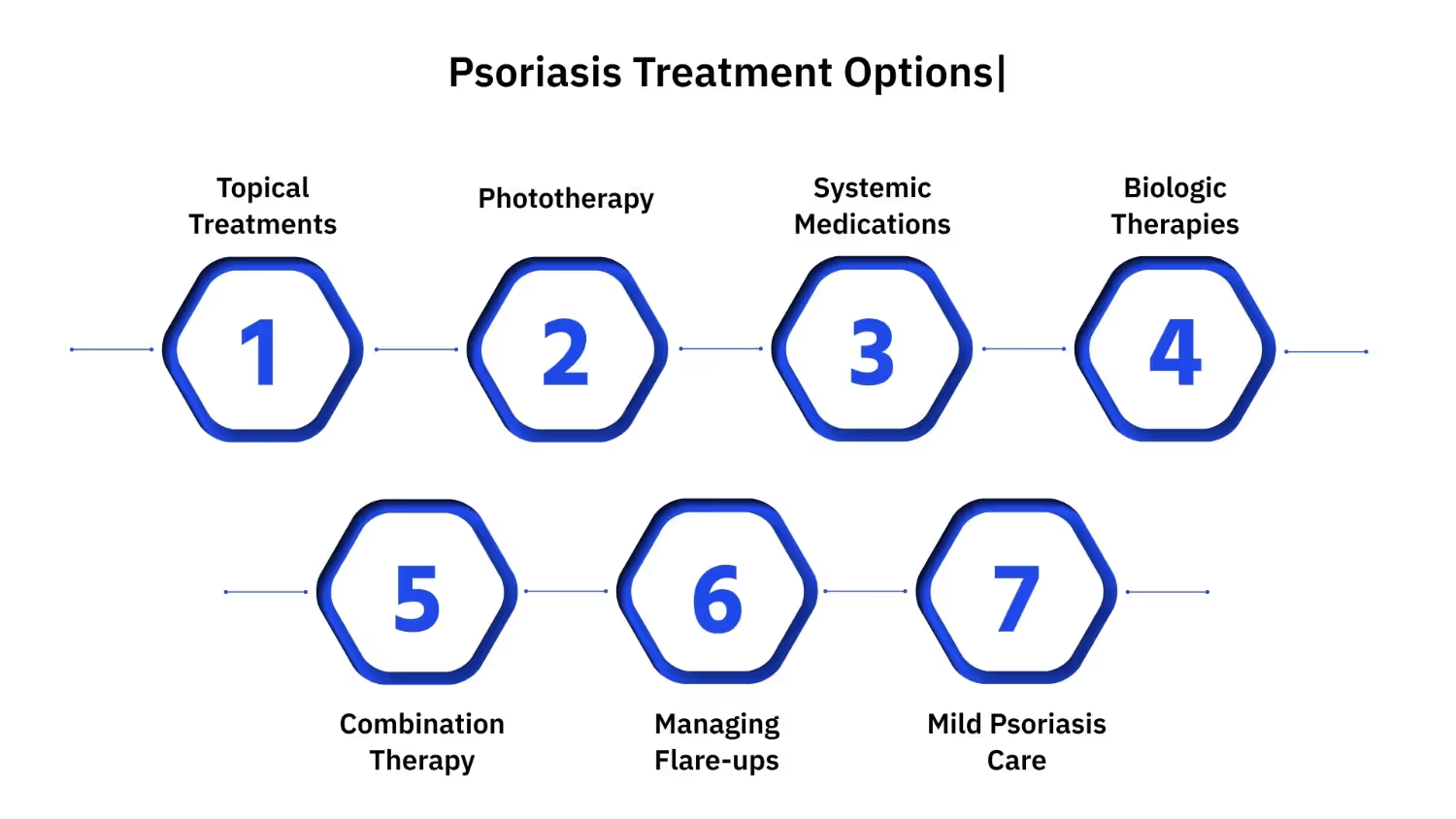
Effective psoriasis management depends on your symptoms, severity, and overall health. Your dermatologist will create a treatment plan tailored specifically to you, aiming to control inflammation, slow skin cell growth, and reduce flare-ups.
Topical Treatments
For mild to moderate psoriasis, doctors often use medications applied directly to affected areas:
- Corticosteroids reduce inflammation and slow skin cell production. Your dermatologist determines the right strength and formulation for your affected areas.
- Vitamin D analogues such as calcipotriol or calcitriol can help manage scaling and inflammation without causing skin thinning, making them suitable for long-term care.
- Topical retinoids, derived from vitamin A, help normalise skin cell turnover and ease inflammation.
- Coal tar preparations remain effective for reducing itching, scaling, and inflammation in many patients.
- Salicylic acid preparations may be suggested to soften scales and enhance the effectiveness of other treatments.
Phototherapy
Doctors sometimes use controlled light therapy for moderate or widespread psoriasis:
- Narrowband UVB therapy slows skin cell growth and reduces inflammation. Treatment is supervised 2–3 times per week over several weeks.
- PUVA therapy combines a medication called psoralen with UVA light exposure. This approach is reserved for severe cases and is carefully monitored by your dermatologist.
Systemic Medications
Moderate to severe psoriasis may require oral or injectable medications that work throughout the body:
- Methotrexate is an immunosuppressant that reduces inflammation and slows skin cell turnover. Blood tests are monitored to ensure safety.
- Cyclosporine may provide improvement, but is usually used for the short term due to side effects.
- Acitretin, an oral retinoid, is prescribed for pustular or erythrodermic psoriasis types.
- Apremilast, an immunomodulator, targets specific inflammatory pathways for symptom control.
Biologic Therapies
Biologics selectively target immune system proteins involved in psoriasis and are usually reserved for moderate to severe cases unresponsive to other treatments:
- TNF-alpha inhibitors such as adalimumab and etanercept block inflammatory proteins.
- IL-17 and IL-23 inhibitors are newer options that provide highly effective symptom relief.
- All biologics require careful monitoring by your dermatologist for potential side effects.
Combination Therapy
Your dermatologist may integrate multiple treatments to improve results. Topical therapies may be combined with phototherapy or systemic medications to strengthen control and minimise flare-ups.
Managing Flare-ups
During acute flare-ups, your dermatologist might adjust your treatment plan temporarily, including prescribing more potent topical medications or short-term systemic therapy. Identifying triggers and following your doctor’s guidance helps prevent future flare-ups.
Mild Psoriasis Care
Even limited psoriasis benefits from professional guidance. Your dermatologist can suggest topical treatments alongside daily moisturising, gentle skincare, and stress management techniques. Following their instructions consistently is key to maintaining long-term control.
It's important to always consult a qualified dermatologist for diagnosis and personalised treatment. At Velantis Dermatology, Dr. Janani Sree C M provides comprehensive, evidence-based psoriasis care tailored to your condition. Contact us to start your personalised treatment journey.
Prevention Strategies for Psoriasis
You cannot wholly prevent psoriasis, but specific strategies can reduce flare-ups and support healthier skin. Following these routines consistently makes a noticeable difference in managing your condition.
Daily Skincare Routine
- Moisturise daily with thick, fragrance-free creams immediately after bathing to lock in moisture.
- Use gentle, soap-free cleansers to avoid irritation.
- Take warm (not hot) baths with added oils or oatmeal to soothe inflamed skin.
- Pat your skin dry instead of rubbing, and apply moisturiser while your skin is slightly damp.
Stress Management
Chronic stress can worsen symptoms and trigger flare-ups. Techniques that may help include:
- Doing activities like exercise, meditation, or yoga can help lower stress levels.
- Ensuring 7–9 hours of sleep nightly to support immune function.
- Joining support groups or speaking with a counsellor can help develop effective coping strategies.
Lifestyle Adjustments
- Staying at a healthy weight can lower inflammation and improve treatment results.
- Quit smoking and limit your alcohol consumption because both can increase flare-up frequency.
- Protect your skin from injury with appropriate clothing and use sunscreen to prevent sunburn. Moderate sun exposure may benefit some patients, but it should be discussed with your dermatologist.
Dietary Considerations
- Include anti-inflammatory foods such as omega-3-rich fish, fruits, vegetables, and whole grains.
- Some patients benefit from identifying personal food triggers and avoiding them.
- Reduce processed foods and sugar where possible, but consult your dermatologist before making significant dietary changes or taking supplements.
Following these strategies under your dermatologist’s guidance can reduce flare-ups and improve your overall skin health.
Also Read: Understanding Skin Types and Care
Common Myths About Psoriasis
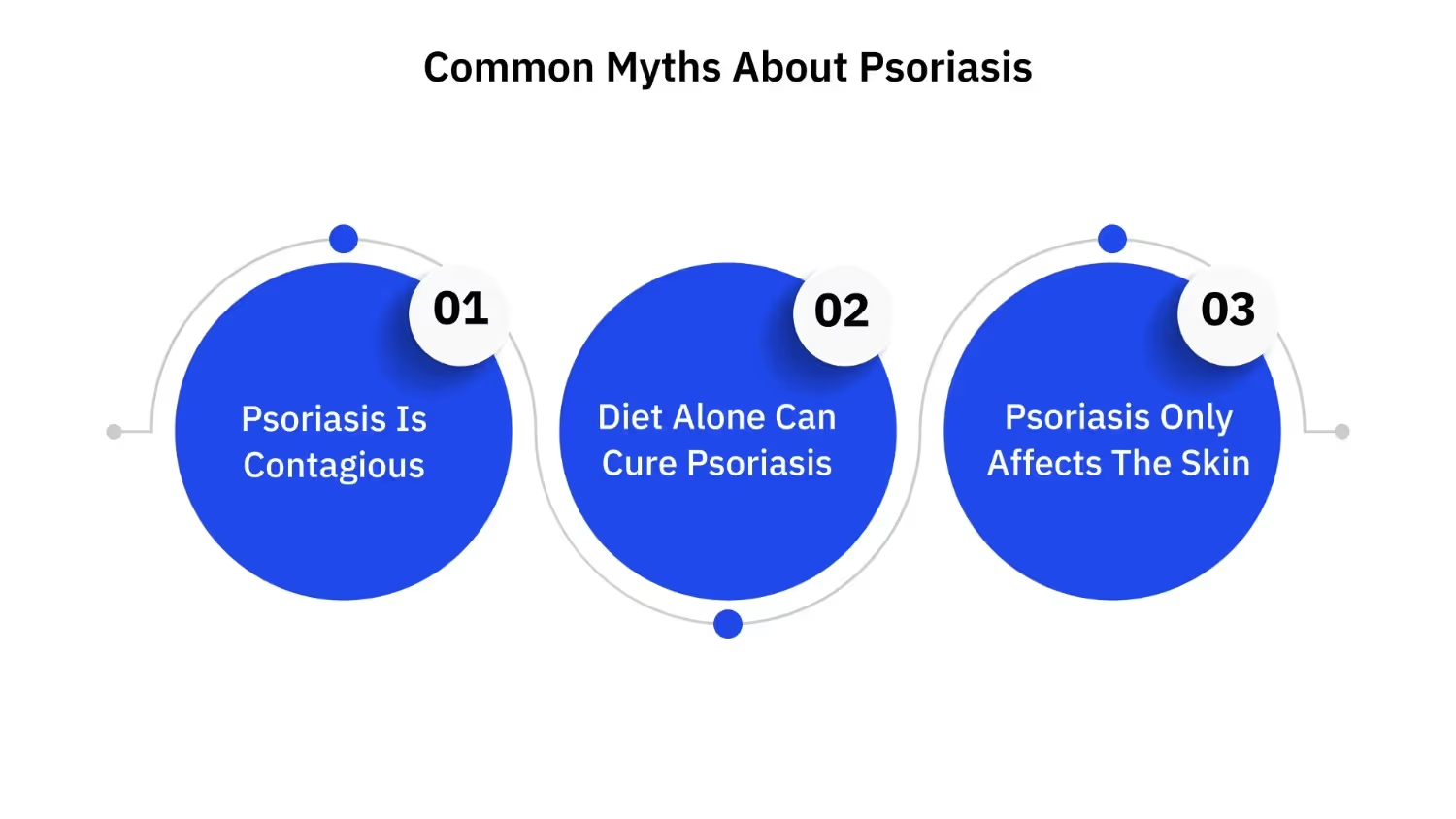
Misconceptions about psoriasis can increase stigma and prevent people from seeking proper treatment for the skin disease psoriasis. Below are some of the common myths about Psoriasis.
Myth 1: Psoriasis is Contagious
This is entirely false. Psoriasis is an autoimmune condition that cannot spread from person to person. You cannot catch psoriasis through skin contact, sharing personal items, or being near someone with the condition.
This misconception causes unnecessary social isolation and discrimination. Educating others about psoriasis helps reduce stigma and creates a more understanding environment for those affected.
Myth 2: Diet Alone Can Cure Psoriasis
While healthy eating may support overall skin health, no diet can cure psoriasis completely. Some people may notice improvements with dietary changes, but these effects vary greatly between individuals. Proper medical treatment remains essential for effective management.
Extreme diets or unproven supplements can be harmful and delay appropriate medical care. Always discuss dietary approaches with your dermatologist alongside conventional treatment options.
Myth 3: Psoriasis Only Affects the Skin
Psoriasis can affect multiple body systems. Multiple patients develop psoriatic arthritis, causing joint pain and damage. The condition also increases the risk of heart disease, diabetes, and depression.
Mental health impacts are significant, with higher rates of anxiety and depression among psoriasis patients. Comprehensive care addresses both physical symptoms and psychological well-being for optimal outcomes.
Conclusion
Psoriasis doesn't have to define your life or limit your potential. With proper understanding, professional care, and effective psoriasis treatment, you can successfully manage this condition and reclaim your confidence.
Remember that psoriasis affects millions of people worldwide, and you're part of a community that understands your challenges. Modern treatment options offer hope for improvement and a better quality of life. The key is working with an experienced dermatologist who understands your unique needs.
Here, at Velantis Dermatology, we provide comprehensive, evidence-based psoriasis treatment tailored to your specific condition. Our patient-first approach ensures you receive ethical, effective care without unrealistic promises or quick-fix solutions.
Take the first step toward calmer, healthier skin. Book a call to begin your treatment journey with Dr. Janani Sree C M, our trusted MD dermatologist.
FAQ’s
Q1. What is the best treatment for psoriasis?
A1. The best treatment depends on severity, affected areas, and overall health. Dermatologists may prescribe topical corticosteroids, vitamin D analogues, phototherapy, or systemic medicines. Combining medical therapy with lifestyle adjustments often improves skin appearance and reduces flare-up frequency effectively.
Q2. How is psoriasis treated during pregnancy?
A2. Treatment during pregnancy prioritises safety for mother and baby. Doctors may recommend emollients, mild topical steroids, or UVB phototherapy. Stronger medicines are usually avoided.
Q3. Does vitamin D help psoriasis?
A3. Vitamin D, through supplements or controlled sun exposure, may support skin cell regulation and reduce inflammation. Doctors sometimes prescribe topical vitamin D analogues. It is not a cure but can complement other psoriasis treatments for better outcomes.
Q4. Is psoriasis fungal?
A4. Psoriasis is not fungal. It is an autoimmune skin disorder where the immune system accelerates skin cell turnover, leading to scaling and inflammation. Fungal infections may resemble psoriasis but require different treatment, making an accurate medical diagnosis essential.
Q5. Can psoriasis spread?
A5. Psoriasis is not contagious and does not spread through skin contact. However, it may progress to new areas on the body over time. Proper treatment and trigger management can slow its progression and minimise flare-ups effectively.
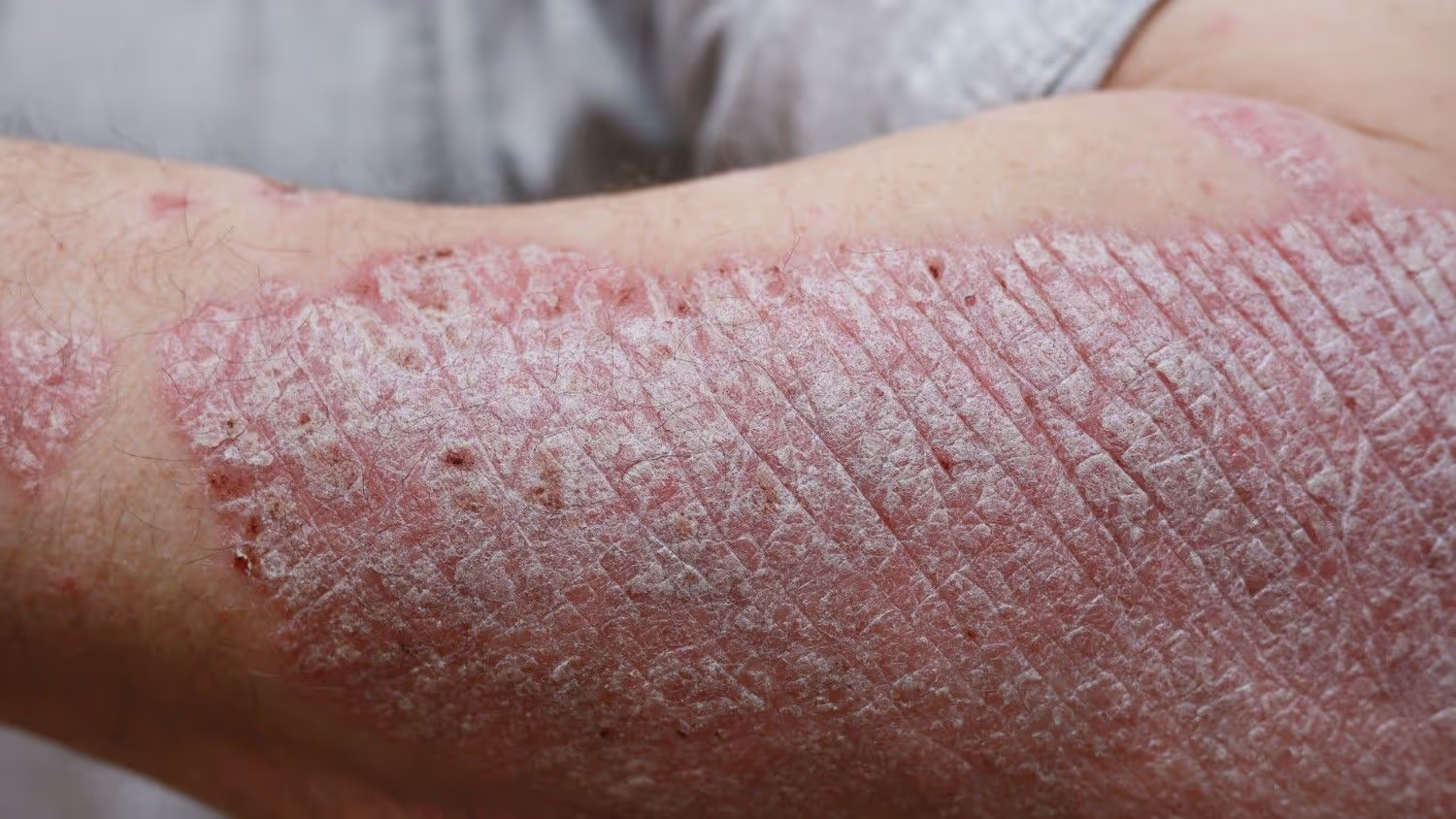

.png)
